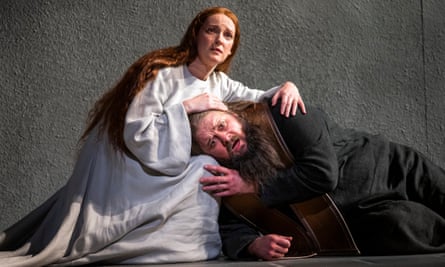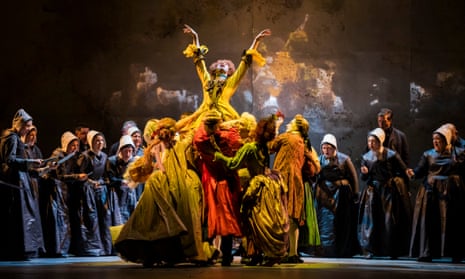Jephtha is Handel’s last masterpiece, premiered on the site of the Royal Opera House 271 years ago, the work of a composer struggling with age, failing health and worse eyesight. It is also, as the engraved words on the huge stone slabs that make up Simon Lima Holdsworth’s set remind us, a story of religious war in the Middle East. Jephtha was the Old Testament chief who, in return for a God-given victory over the Ammonites, vows to sacrifice the first thing he sees on his return, only to find himself greeted by his daughter. In Oliver Mears’s new production, planned long before the current crisis, overt religious symbolism is largely sidestepped – but the threat of bloody violence isn’t, and some moments make for uncomfortable viewing.
There are no heroes. Jephtha, rivetingly played by Allan Clayton, is a wide-eyed zealot who makes his fateful pronouncement standing on his bed in nightgown and cap, his wife Storgè asleep beside him, or at least pretending to be – clearly there was genuine affection between them once, but now he avoids her touch. He seals his oath with a burst of self-flagellation, before writing it down in his own blood. His people are a grim-faced lot in puritanical black and grey, each toting their holy book. The Ammonites, by contrast, are a fun if incontinent bunch, uninterested in war: they dance and debauch under a golden chandelier, as if in a Hogarth engraving coloured by Tiepolo. They don’t last long.
Technically there is a happy ending, initiated here not by an angel but by Jephtha’s previously silent younger son – the boy treble Ivo Clark sings his aria beautifully. But the musical rejoicing that follows is thoroughly subverted by how Mears wraps things up. This includes a surprise entrance that turns a swathe of the stalls into restricted-view seats in the closing minutes. Yet even if not everything works, Mears gets a level of detail from the cast that makes individual scenes very moving.

There is some very fine singing, not only from Clayton’s magnificent Jephtha, who brings the character’s despotism and humanity to equallyvivid life, but from Jennifer France, whose soprano sparkles as his unlucky daughter Iphis. The countertenor Cameron Shahbazi sounds less secure but still sweet as Hamor, Iphis’s fiance, and Alice Coote’s expressive singing makes much of desperate Storgè, plagued by nightmares of smoke-breathing zombies. Brindley Sherratt booms as the solid, dangerous Zebul.
The hardworking chorus sings with conviction if not the stylistic assurance of a baroque specialist group; the mainly modern-instrument orchestra is at times in danger of covering it. Laurence Cummings conducts with a propulsion that sometimes edges into relentlessness, all of a piece with this flawed yet powerful staging.

Comments (…)
Sign in or create your Guardian account to join the discussion